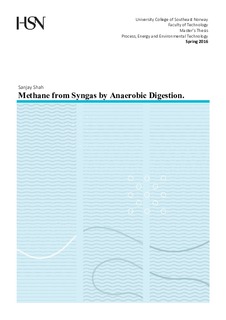Methane from Syngas by Anaerobic Digestion
Abstract
Anaerobic digestion is a prominent green technology used for methane production from organic waste. Previous studies have shown that CH4 in AD can be increased by adding inorganic electron donors such as H2 and CO. These can be for example; produced as syngas from wood. If so, AD could be a method to convert the syngas into methane. The principal of this thesis work is to implement syngas into AD.
In this thesis, the principles were investigated by experimental work and modelling. The experiment did not give any useful result, but relevant experimental data was found in the literature.
Modelling involves implementing syngas degradation pathways into the ADM1 model. Simulation is carried out by choosing an experimental sludge treatment study by Batchstone[2], a published pilot scale case with experimental data where model parameters were used as the best case. The case was further modified by a diffusive link in AQUASIM software. Three different compositions; the first one is pure hydrogen, and two other compositions of syngas are 86% H2, 7% CO and 7% CO2, and 44.4 % H2, 33.3 % CO and 22.2 % CO2 respectively were used for simulation.
The CH4 production rate can be increased up to 40% by adding H2 and the threshold limit i.e. 𝐿𝑜𝑎𝑑 𝑜𝑓 𝐻2𝐿𝑜𝑎𝑑 𝑜𝑓 𝐹𝑒𝑒𝑑 ratio is 0.35(kgCOD hydrogen.day-1 / (kgCOD feed.day-1) where the threshold corresponds to pH going above 8.5. The maximum CH4 content in the produced biogas is around 94%. The addition of H2-rich syngas (composition of 86% H2, 7% CO and 7% CO2) shows more favorable condition than pure H2. 𝐿𝑜𝑎𝑑 𝑜𝑓 𝐻2𝐿𝑜𝑎𝑑 𝑜𝑓 𝐹𝑒𝑒𝑑 ratio is around 0.89 and CH4 production rate can be increased up to 60%. The CH4 content with H2-rich syngas is around 81%. The third composition of syngas (44.4 % H2, 33.3 % CO and 22.2 % CO2) produce more biogas but CH4 content obtained from simulation results is only around 49%.
